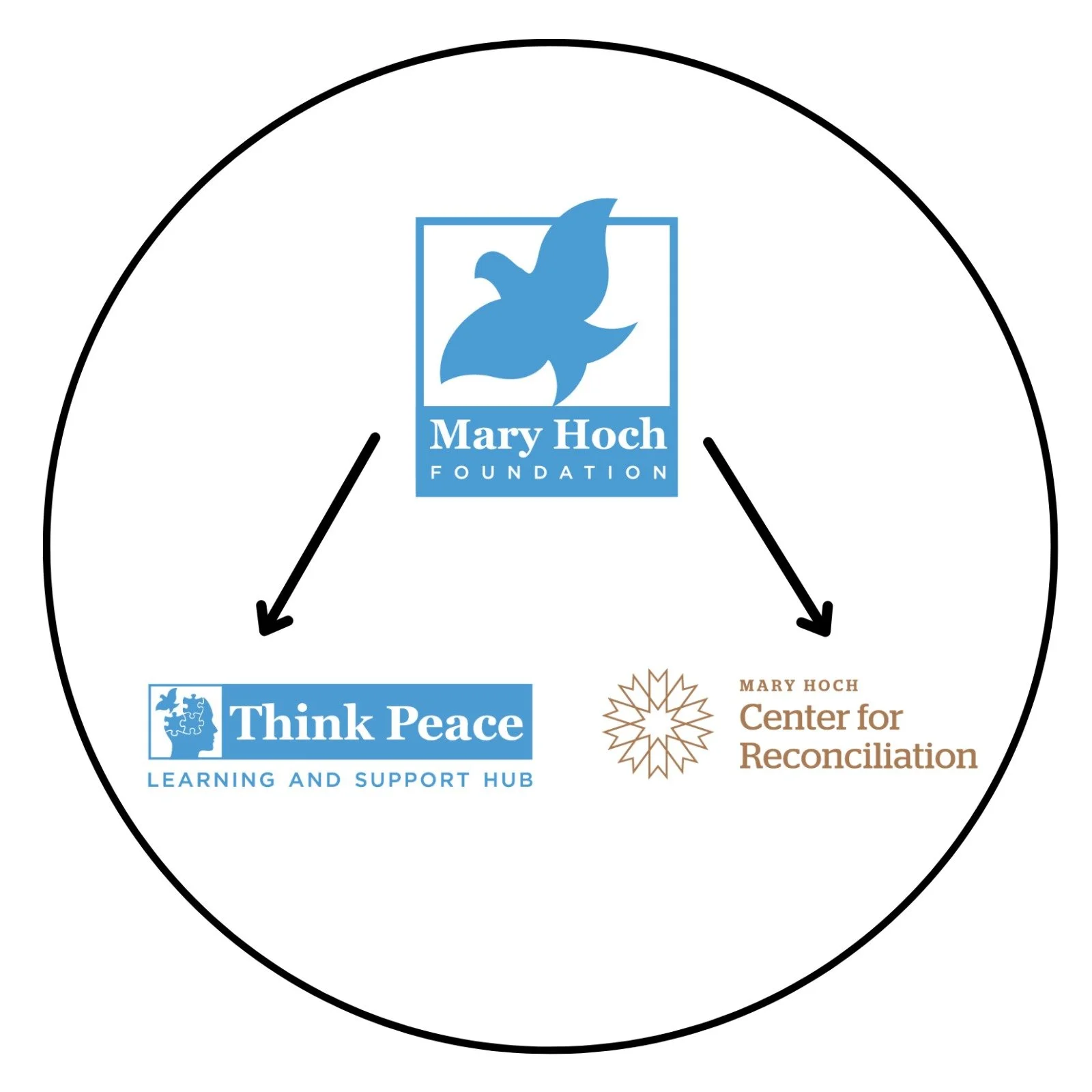By: Hannah Adamson
In the autumn of 2021, the Mary Hoch Foundation (MHF) and Think Peace Learning and Support Hub were created to expand the scope and impact of the Mary Hoch Center for Reconciliation (MHCR). As non-academic affiliated partner organizations, they have an increased capacity to support ongoing reconciliation initiatives, both in the United States and abroad, and meet current needs for healing and transformation. MHF serves as a leader of these three entities and supports both the Think Peace Hub and MHCR in their complementary workflows.
Building upon MHCR Research Affiliate Colette Rausch’s Think Peace Podcast (examining the role of brain science in peacebuilding) the Think Peace Learning and Support Hub will be convening a global community of practice in partnership with Humanity United. This community of practice will focus on the integration of neuroscience and peacebuilding knowledge with practice. “We have seen longing for truth amidst polarization and division. The Think Peace Hub is launched to help to plan these processes and share learning with others,” says Antti Pentikäinen, one of the Conveners of Think Peace and Director of the Mary Hoch Center for Reconciliation.
Two regional learning hubs–one gathered by David Ragland in the United States and the other in the Horn of Africa by Tecla Namachaja Wanjala–will form the basis for the expanding community of practice. These two initial hubs will gather local practitioners to share experiences, learn from each other, and access needed resources to improve their work. The goal of these hubs is to provide the best possible assistance for truth telling and healing, benefitting from previous experiences and recent scientific discoveries, such as neuroscience and peacebuilding. With over two decades of experience supporting local truth commissions, Eduardo Gonzalez emphasized how “we believe that continuous learning from other experiences is necessary and helpful to ensure that truth telling and healing efforts achieve anticipated impact.” These hubs offer crucial opportunities for peer learning to maximize the positive impact of truth and reconciliation initiatives.
The desire and need for such hubs have been articulated by those leading or planning commissions. For instance, the Vice Chair of the Iowa City Truth and Reconciliation Commission, Amel Ali stated, “It is very important to us to be reaching out to other groups who are already doing the work. Having a community that trusts, loves, and celebrates is what I imagine.” This community of practice is a core component of Think Peace’s workstream, specifically through the US Truth and Reconciliation Hub, alongside the International Reconciliation, Peacebuilding, and Truth Telling Hub, and a Transitional Justice Course.
These initiatives continue alongside the existing work of the Mary Hoch Center for Reconciliation, which supports insider reconcilers, conducting reconciliation research, and working to disseminate information to advance reconciliation practice. Partnering these organizations offers a unique opportunity to champion reflexive practice through insights gleaned through research, consultations with practitioners, and new scholarship. MHCR Associate Director and Carter School PhD Candidate Nick Sherwood says of this partnership:
“By bridging MHCR, MHF, and Think Peace, students at George Mason and the Carter School will be able to interface with global leaders of reconciliation practice. This means MHCR’s ongoing research projects will gain an additional theoretical and practical edge. MHCR and our staff will double down on creating knowledge related to reconciliation, peacebuilding, and the psychological components of each, then this knowledge will inform MHF’s work - and their work will bolster our research. I’m really excited for this new phase of MHCR, and our staff is already looking forward to the synergies that will come from this partnership.”
While now separate entities, the value of student involvement and growth is still prioritized in these new structures outside of an academic environment. James Hoch, Chairman of the Mary Hoch Foundation, views the Think Peace Hub as a natural next step after helping to launch the Mary Hoch Center for Reconciliation.
“The research is compelling on how effective truth and healing processes can become when you help actors to learn from each other and see how integrating brain and behavior science increases impact. Mary Hoch Foundation wanted to make sure operational work can grow organically outside academia while continuing to benefit from the research at MHCR and involve students.”
Reflecting on the relationship between Think Peace and MHCR, Antti Pentikäinen, shared,
“Think Peace is being built based on the research and bold outreach that MHCR did to support the Truth Racial Healing and Transformation Commission and healing in the United States. We hope the hub can continue to expand and sustain that work which includes support for local truth commissions in the U.S. and internationally. It would be ideal that MHCR, its research and GMU student involvement, would remain an integral part of these efforts.”
Thus some of the ways this collaboration has been realized is through the integration of MHCR’s Insider Reconciler Fellows into the global community of practice, student research support contributing to the mapping of truth initiatives around the US, and two GMU students–Jena Kitchen and Cameron Cassar–directly hired to become part of the Think Peace team. This unique collaboration is one of the many things that makes the Mary Hoch Foundation special and uniquely equipped to sustain support for ongoing work.
Moving forward, the Mary Hoch Foundation, Think Peace Learning and Support Hub, and the Mary Hoch Center for Reconciliation have the capacity to cultivate strong peer-support networks amongst peacebuilders and change-makers, provide tailored support to reconciliation initiatives, offer opportunities for the growth and mentorship of new peacebuilders, and innovate peacebuilding practice through critical research.

